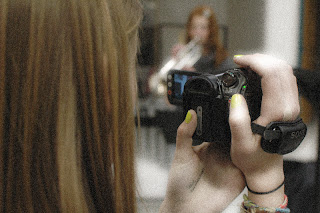Trina Dralus's Blog:
After this weeks reading, I feel inspired and motivated to see the possiblities in myself and in everyone around me. I am in love with this book. I have so many favorite quotes and pages that I could write forever. So I will try to be concise in my feelings and inspirations from the Art of Possibility.
The first thing that inspired me was from the TED video when Benjamin Zander said, “I’ll never say anything that couldn’t stand as the last thing that I ever say. It is a possibility to live into.”
I mean wow! I know this will be a quote I have to remind myself of daily possibly hourly, but what a way to live your life.
The next thought that struck me was the whole idea of the book, that being to think beyond the constraints of today and imagine the possibilities. Thinking outside of the box and allowing the possibility of recreating your paradigm often leads us to the perfect solution. Life really is all about how we invent it. Each new paradigm gives us the opportunity to see things that we may not have seen before. Exposure to different ideas and mind-sets allow us to see other ways of doing things, which can be very powerful.
My next moment of clarity occurred while reading the comments made on competition. So as good as competition can be to motivate one to push harder, it can be a strain on friendships and lead to a solitary journey. This makes me think of Race to the Top, a program that bases teachers’ pay on test scores. The new Govenor of Florida says healthy competition will improve our school systems, but is this the type of competition we want? Is our ultimate goal for teachers to retreat from collaboration and work alone? Won’t this lead to thinking of our children as liabilities and of each other as an obstacle to overcome? Will this lead to more effective practices in teaching? What kind of example will we be setting for our children? This seems to me like the opposite of seeing the possibilities in each other, which makes me very sad.
Giving an A was a very moving chapter for me. When we look for the beauty within or give an A to ourselves or to others, we see the possibilities that exist in all of us. The measurement world often gets in the way with Standardize testing and curriculum maps and so forth. Chipping away at the stone to find the passion and the brilliance in each of us will add beauty where none was seen before. This giving an A comes from a place of respect, not from how others or myself measure up to arbitrary standards. This acceptance or A gives us room to realize who we really are. I feel this program at Full Sail has done that for me. Sometimes I feel like my work may not be A work if you compared me to other students in this class, but somehow I get an A as well. This has allowed me to realize things about myself that I did not realize before. I grew up feeling stupid because I struggled while learning to read. I was diagnosed with Dyslexia, which I thought meant that I was dumb and couldn’t learn like everyone else. As I have grown and become more educated on Dyslexia and on myself I realize that only half of that is true. I do learn differently then others, but I am not dumb. Seeing many of those A’s has helped me to realize this- finally. I can finally see the possibilities in myself.
One of my favorite parts of this book is where Zander (2000) stated “The freely granted A lifts you off the success/failure ladder and spirits you away from the world of measurement into the universe of possibility. It is a framework that allows you to see all of who you are and be all of who you are, without having to resist or deny any part of yourself” (pg. 46). This is life changing.
The starfish story found in chapter 4 is a type of inspirational story that we focus on at my school. During our Professional Learning Communities, which is where my team of 2nd grade teachers meet monthly to reflect and learn from a book we are reading together, our mantra is based on the starfish story. Our Literacy Coach has given each of us a starfish as a reminder of the importance of reaching each child.
This is just another reminder that I want to be a contribution to my life and to others. I firmly believe in this, and I need to remind myself that the how’s and whys are not as important as just showing up and giving my all. I can’t wait to read the rest of this book!
Zander, R. S., & Zander, B. (2000). The art of possibility. Boston, MA: Harvard Business School Press
My Response:
Trina,
The book maybe inspiring, but your writing is inspirational in itself. I thoroughly enjoyed your thoughts on this book. Your passion for this book is well-founded and I love it too.
The shaping of our reality and the way perceive is so true and so important to remember. I have always tried to shape my world to my best advantage, and I hope I can even take this idea further.
The 'getting and A' was the way I want to teach and to be taught. This is truly how I want to go through life! Again, beautiful writing Trina.




















